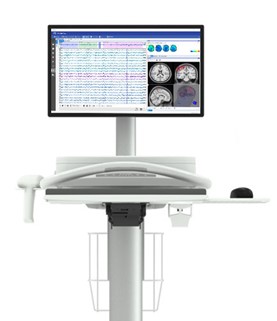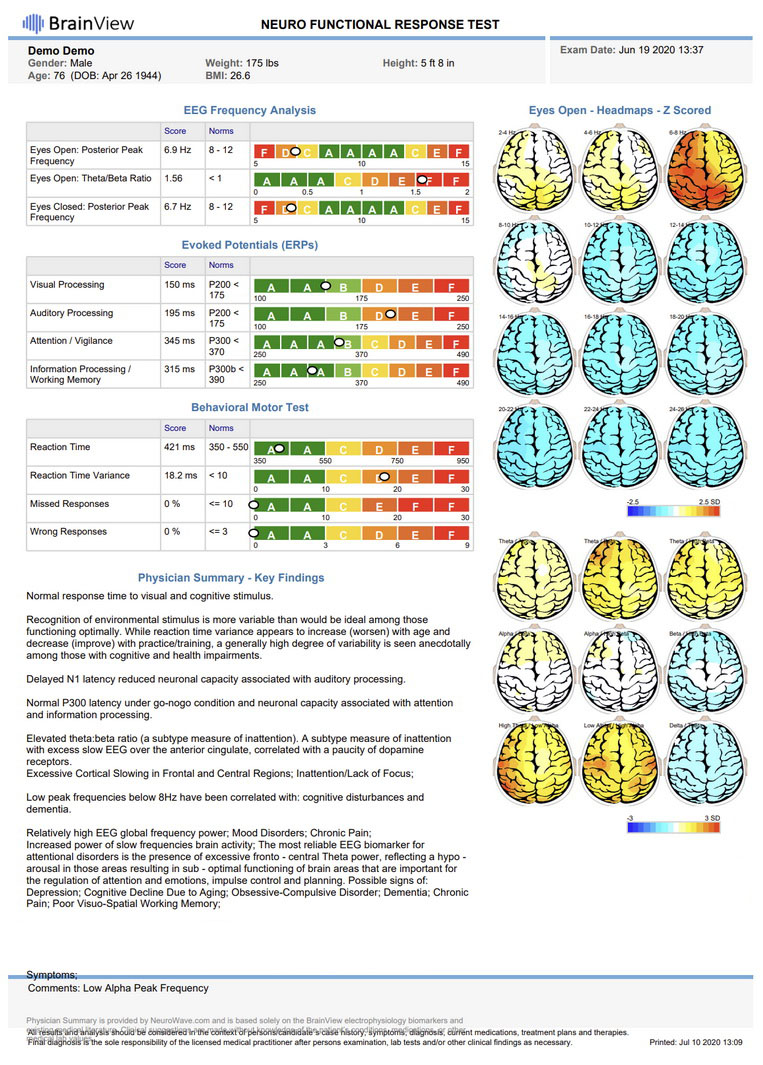- +1 800 433 4609
- |
- Request Info
- |
- Login
Leading-Edge Objective Cognitive Assessment Testing
The world's LARGEST standardized neuroscientific database.
BrainView System
BrainView technology is a scientific breakthrough in brain health management and diagnostic.
BrainView allows medical professionals, to see more and know more than ever before.
BrainView baseline testing in high-risk professionals such as: athletes, military personnel, and first responders, can confirm if subsequence injury has impacted the cognitive health, to help monitor recovery progress and validate the efficacy of treatment.
Request Information
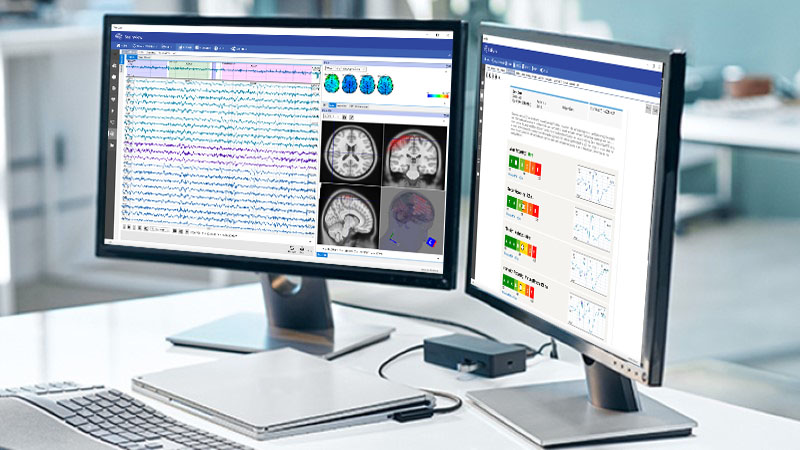
Brain View for Early detection of Concussions & Trauma
As healthcare providers are aware; physical activity, sports, or even everyday life can pose risk of injury from concussions. Fortunately, BrainView aids in the early detection of cognitive deficits and post-concussion syndrome.
The BrainView system enables your physician to quickly assess post-concussion and cognitive impairment to help the diagnosis process. Early diagnosis of cognitive disorders allows for quicker treatment of the causes like nutritional deficiencies, stress, and thyroid problems.
Sports that pose a high risk of concussion or head trauma include: Football, Basketball, Hockey, Lacrosse, Rugby, Soccer, Gymnastics
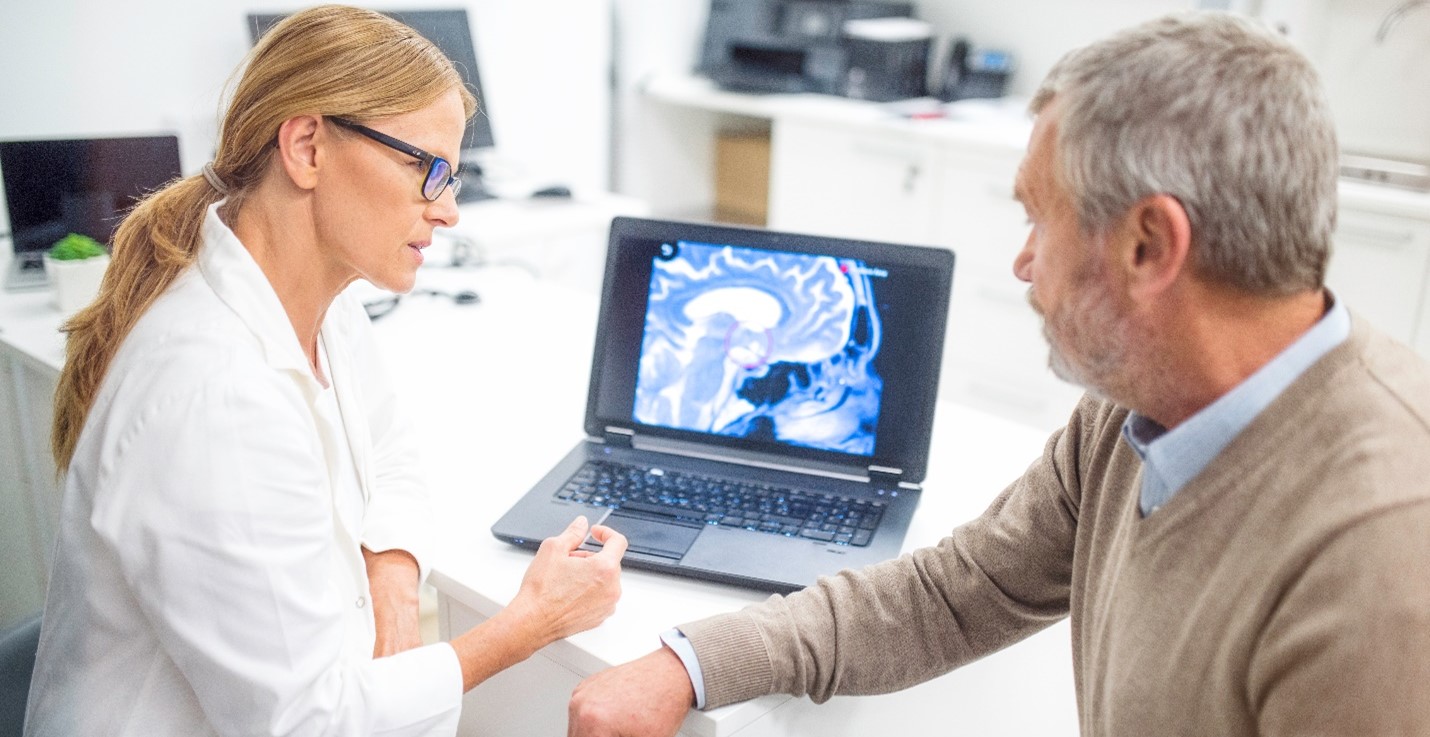
Traditionally Mini-Mental Status Exams (MMSE) were the standard testing to evaluate cognitive impairment. Unfortunately, this subject test, often leaves much unknown. The BrainView system, offers an objective tool to help identify and assess cognitive impairment.
The BrainView system provides an objective and expansive functional measurement of the brain and cognition by using multiple technologies such as:
Concussion or head trauma can cause symptoms of fatigue, nausea, or forgetfulness, as well as physical symptoms such as headache or blurry vision. With BrainView, our providers can detect signs and symptoms early and get you your patient cleared for return to sports or work.
In addition, neurofeedback treatments can also provide relief for those suffering from long-term symptoms of cognitive impairment, such as former athletes or patients with an elevated risk of cognitive defects.
The BrainView system provides an objective and expansive functional measurement of the brain and cognition by using multiple technologies such as:
- Electroencephalography (EEG)
- Electrocardiography (ECG)
- Event-Related Potentials (ERP)
- Quantitative Electrocardiography (QEEG)
- Brain 3D Mapping (eLoreta Source Analysis)
Concussion or head trauma can cause symptoms of fatigue, nausea, or forgetfulness, as well as physical symptoms such as headache or blurry vision. With BrainView, our providers can detect signs and symptoms early and get you your patient cleared for return to sports or work.
In addition, neurofeedback treatments can also provide relief for those suffering from long-term symptoms of cognitive impairment, such as former athletes or patients with an elevated risk of cognitive defects.
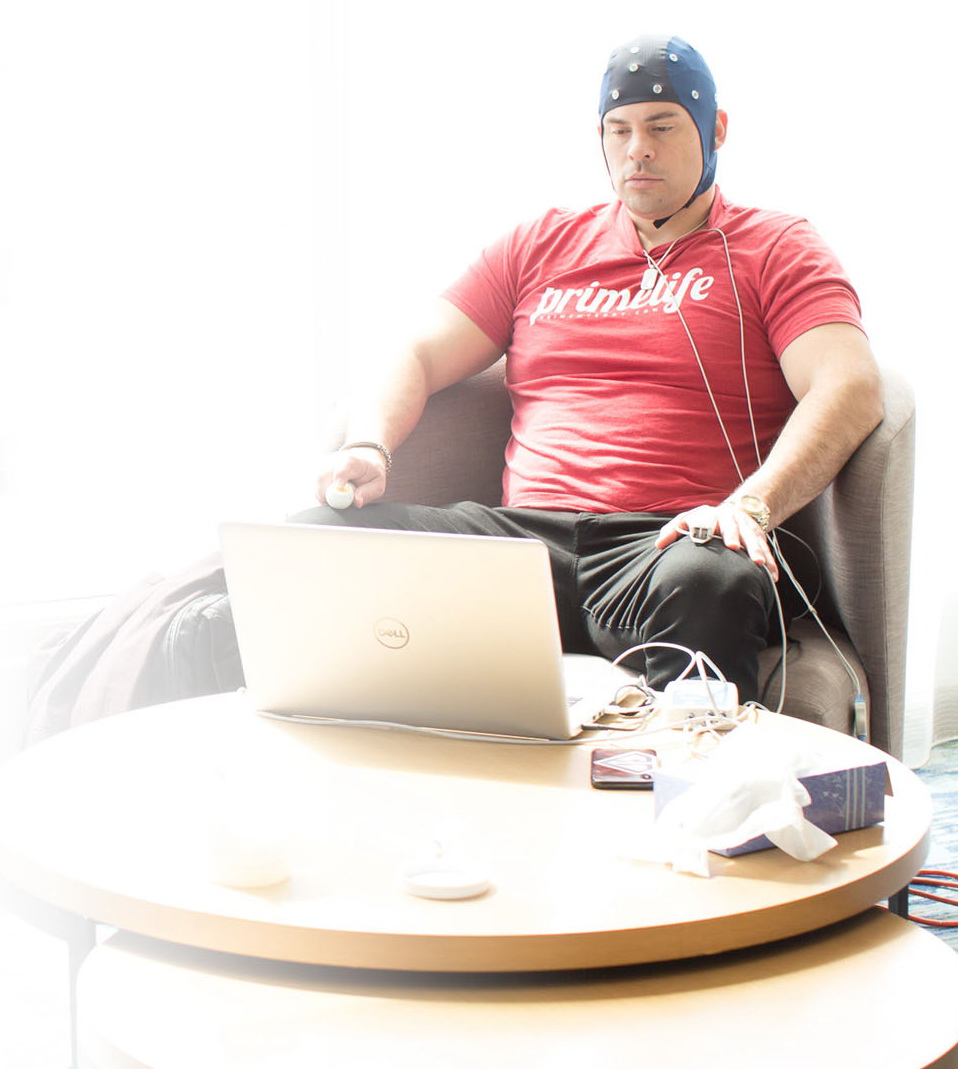
What is a concussion?
A concussion is a form of mild brain injury that results when the brain is exposed to trauma, that affects the brain function. Types of trauma include motor vehicle accidents, other collisions, sports injuries, head to head, head to ball, head to helmet, helmet or stick to helmet, fall, assault or whiplash injury.
Regardless of the type of force sustained, the type of mechanism of brain injury is thought to be the same;.i.e., alteration of brain neurons and their connecting fibers thru strain, stretch, cellular swelling and "molecular cascade" of cellular ionic imbalance over days to weeks.
Fortunately, that the majority of concussions, 85-90%, resolve fully within a short period of time - one to six weeks.
The symptoms of concussion may be apparent immediately or delayed for 24-48 hours. The symptoms fall into three main categories; somatic, cognitive, behavior-mood - PCS form:
Somatic symptoms may include: headache, neck pain, fatigue, nausea, dizziness, light- headedness, sensitivity to light and sound, unsteadiness of balance, and insomnia or hypersomnia.
Cognitive symptoms may include: lapse of attention, sense of forgetfulness when completing a task, sense of immediate disorientation or confusion, slowness with processing information such as when listening, reading, writing, texting, playing electronic games, sense of information overload and exhaustion with very little "cognitive load", delay or loss of immediate memory.
Behavior and mood symptoms may include: irritable, moody, anger, sadness, worry without provocation, impulsive display of emotions such as yelling, shouting, aggression, acting out of character.
Traumatic Brain Injury (TBI)
BrainView uses an EEG based algorithm for the assessment of brain function impairment, obtained from the same EEG recording used to aid in early clinical diagnosis of concussion and referrals. Using the rapidly acquired EEG data, BrainView also provides an objective assessment of brain function impairment, including concussion, using the BrainView algorithm. The BrainView algorithm includes not only EEG features, but also those that measure changes in "connectivity" between brain regions, reflecting the physiological changes seen with concussions.
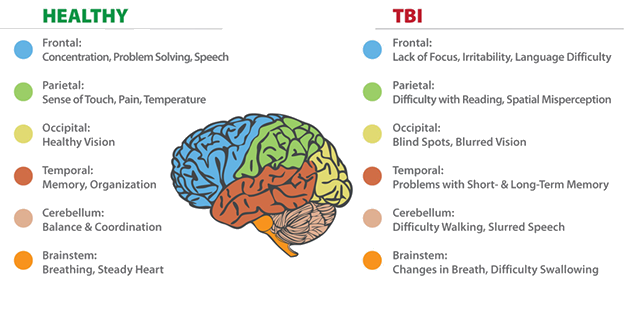
The BrainView Concussion Score is expressed as a percentile of a non-head-injured population, from 0 to 100, with a lower score showing higher levels of impairment. This enables clinicians to make more confident clinical diagnoses of concussion using objective physiological data. An objective multimodal AI derived algorithm with EEG at its core-aids in baselining, clinical diagnosis of concussion, and determining when a patient can safely return to activity.
The BrainView Concussion Score assessment:
The BrainView Concussion Score assessment:
- Demonstrated in validation study to have high accuracy for identifying likelihood of concussion, to be a stable measure over time, and can be reliably interpreted as a measure of change over time.
- Shown to be correlated with white matter integrity as seen with Diffusion Tensor Imaging.
- Includes neurocognitive performance and vestibular information with EEG as highest contributor to the algorithm.
The Concussion Score assessment incorporates rapidly acquired EEG data, cognitive performance testing, and specific clinical signs/symptoms into a multimodal algorithm to objectively assess concussion, with the largest contribution from EEG features. BrainView aids in objective clinical diagnosis and in determination of readiness to return to activity.
The Concussion Score is expressed as an index from 0 to 100 with a lower score indicating greater severity of injury. The Concussion assessment is useful, because it can be used to longitudinally assess patients at baseline, injury, as well as recovery time. Baseline assessment help establish a case specific reference point to assist in evaluation of an injury at a later point in time. Concussion assessment can guide clinical decision making at various stages of management after the injury occurs.
The Concussion Score is expressed as an index from 0 to 100 with a lower score indicating greater severity of injury. The Concussion assessment is useful, because it can be used to longitudinally assess patients at baseline, injury, as well as recovery time. Baseline assessment help establish a case specific reference point to assist in evaluation of an injury at a later point in time. Concussion assessment can guide clinical decision making at various stages of management after the injury occurs.
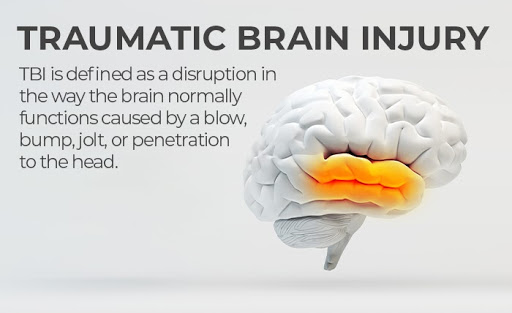
BrainView includes a customizable battery of several cognitive performance tests, which are performed by the patient on the handheld device. These tests measure several cognitive functions including visuomotor reaction time, simple motor speed, working memory, and response control. Results can be calculated in comparison to normative data based on the non-head-injured population of the same age and gender and in comparison, to previous results for that patient using a reliable change index computation.
BrainView aids in the evaluation and management of concussion, enabling earlier treatment and lessening time to recovery.
To supplement the EEG-based and cognitive performance assessments, BrainView has digitized several standard clinical assessments commonly used by clinicians to evaluate head-injured patients.
Request Information
BrainView aids in the evaluation and management of concussion, enabling earlier treatment and lessening time to recovery.
To supplement the EEG-based and cognitive performance assessments, BrainView has digitized several standard clinical assessments commonly used by clinicians to evaluate head-injured patients.
Request Information
